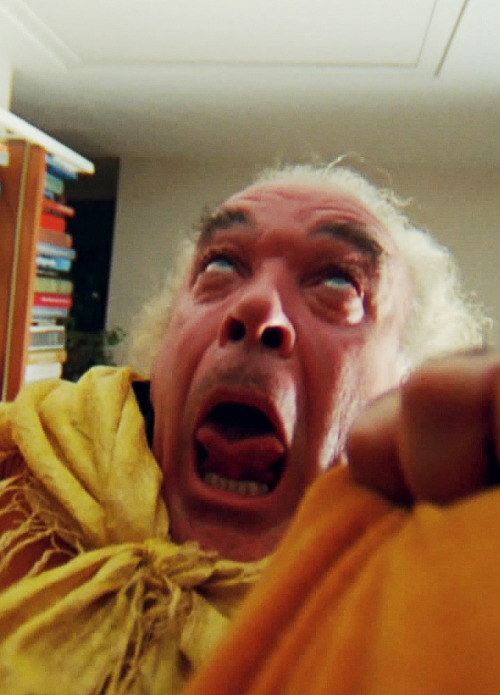Video & Multimedia
Related: About this forumMarat/Sade (1967)
via wiki -
"The Persecution and Assassination of Jean-Paul Marat as Performed by the Inmates of the Asylum of Charenton Under the Direction of the Marquis de Sade, usually shortened to Marat/Sade, is a 1967 British film adaptation of Peter Weiss' play Marat/Sade. The screen adaptation is directed by Peter Brook, and originated in his theatre production for the Royal Shakespeare Company. The English version was written by Adrian Mitchell from a translation by Geoffrey Skelton.
The cast included Ian Richardson, Patrick Magee, Glenda Jackson, Clifford Rose, and Freddie Jones. It was filmed at Pinewood Studios in Buckinghamshire and released by United Artists on February 22, 1967 in the United States, and 8 March 1967 in the United Kingdom. The film's score comprised Richard Peaslee's compositions. David Watkin was the cinematographer.[2] The film uses the full title in the opening credits, though most of the publicity materials uses the shortened form."
The film has a 100% rating from Rotten Tomatoes...but it is not for the squeamish. It is a devastating look into revolution, power, and human frailty.
But the work soon evolves into a dialogue between Marat and De Sade. Though both men were early supporters of the Revolution, their ideas of the shape of the movement took very different courses. Espousing a form of proto-Marxism, Marat is at first presented as the sort of tyrannical idealist that became depressingly familiar in the 20th century, a la Lenin and Pol Pot. But then later, Marat seems haunted by the terror he has unleashed and unable to understand where he went wrong.
De Sade, on the other hand, preached his own unusual brand of Nietzschean existentialism. Unlike Marat, he not only recognizes the inherent weakness of the human character, but he revels in it. Murder as an act of individual passion should be celebrated, De Sade at first argues; murder as an anonymous act of statecraft should be deplored. The individual is not given meaning though politics but through acts of spontaneous passion and desire. As the play progresses, the revolution depicted in the play soon develops into an outright revolution on the stage. ~ Jonathan Crow, Rovi
Make7
(8,543 posts).. and the good characters go through horrific experience after horrific experience. (I guess I'm not necessarily a person that roots for a happy ending to a story.)
I'm unclear how throwing in all the references to persons that weren't born until after de Sade's death reveals what went on during his life - but perhaps the movie is using that time period as a way to advance a narrative which also comments on things later in history.
Bookmarking to watch later.
RainDog
(28,784 posts)wiki notes - On 2 July 1789, he reportedly shouted out from his cell to the crowd outside, "They are killing the prisoners here!", and a disturbance began to foment. Two days later, he was transferred to the insane asylum at Charenton near Paris. The storming of the Bastille, a major event of the French Revolution, would occur a few days later on 14 July.
In 1793 he wrote a eulogy for Marat - even tho he, like so many others, grew disgusted (de Sade... disgusted... really... must take a lot) with the course of the French Revolution with the overthrow of the Girondins and the rise of the Jacobins.
Actually, I can entirely understand why he would despise the Jacobin leader, Robespierre, because Robespierre argued that the Terror was necessary for the virtue of the Revolution. iow, Robespierre justified mass murder for political purposes as a virtuous act.
de Sade said virtue was boring and insipid (I don't agree, overall, but I understand the sentiment well, depending upon how virtue is understood.)
McCamy Taylor
(19,240 posts)Since it is framed as a musical being performed by the inmates of an insane asylum (where de Sade has been committed by his money hungry relatives), it is also quite entertaining and not nearly as preachy as you would expect from the synopsis above.
RainDog
(28,784 posts)and was just mesmerized.
ChazInAz
(2,564 posts)I worked on a grueling production in 1972. My performance as Voltaire caused me to be known by that name for years afterward amongst my fellow theatricals.
RainDog
(28,784 posts)I was always too shy to want to perform for audiences (I always preferred to perform "on paper"![]() but I love the whole world of theater. It's very... uplifting. And it's fun to be around creative people in general.
but I love the whole world of theater. It's very... uplifting. And it's fun to be around creative people in general.
rdmtimp
(1,588 posts)4:30 am Eastern.
RainDog
(28,784 posts)I just thought of it because of I was talking about French Revolutionary era stuff here yesterday.
That's...synchronicity.
I'm plugged in and I don't even know it! ![]()
dipsydoodle
(42,239 posts)Patrick Magee as in Clockwork Orange.

Glenda Jackson as in The Music Lovers.
Find your own link.
RainDog
(28,784 posts)Maybe she learned some thing about dealing with being a member of parliament from this show...